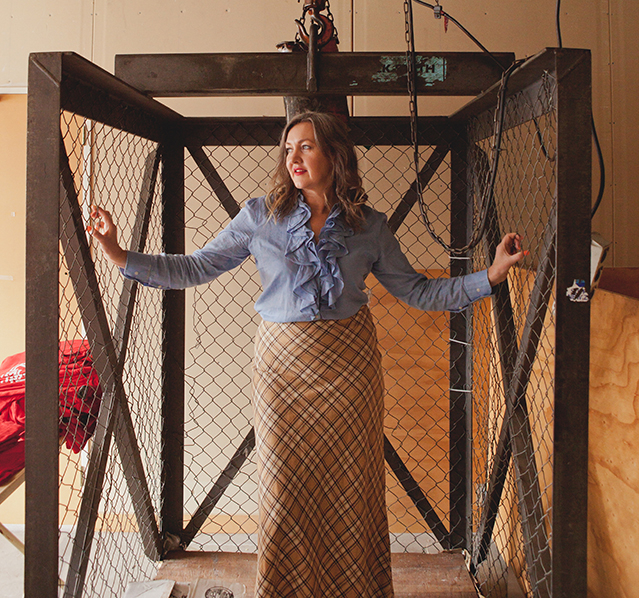It was the one per cent that did it. When Bernadette Casey learned that only one per cent of used clothing is recycled into new fibres globally, the Wellingtonian realised she had to act.
“I was shocked that 90 per cent of textiles can be reused but most end up in landfills, including polyester, which takes hundreds of years to break down,” she says.
That was back in 2008, when the textile importer and fashion lover was asked to write a chapter about sustainable textiles for a friend’s book on climate change.
“Until then, I had no idea the clothing industry was one of the most polluting and waste-generating industries in the world, right up there with oil.
“I learned, for example, that it takes a whopping 8500 litres [of water] to make one kilogram of cotton, which is enough for one pair of jeans, not to mention the pesticides and fertilisers involved.”

Bernadette Casey’s company, The Formary, has gone from strength to strength, with international recognition for its recycled fabrics. and more innovation on the horizon. (Image: Peta Mazey)
Thanks to the rise of cheap, disposable clothing, the average person now buys 60 per cent more clothes every year and keeps them for about half as long as 15 years ago, generating a huge amount of waste.
In fact, of the 80 billion pieces of new clothing produced globally every year, it’s estimated that most end up in landfills or are incinerated.
At the time, Bernadette was importing textiles from China to be made into bedlinen and shower curtains. Her discovery led to a more sustainable business model.
“Wellington has such a strong coffee culture, but nothing was being done with the leftover coffee sacks, so my friend Sally Shanks and I started making hats and bags out of them,” she says.
The business was going swimmingly, prompting someone to suggest they take their idea to Starbucks in the US.
Although the global coffee giant wasn’t won over by the hats, they liked the concept of reusing coffee sacks for upholstery. So Sally and Bernadette worked out how to combine the sacks with New Zealand wool to develop a cutting-edge upholstery fabric which is used in some of Starbucks’ 29,000 stores around the world.
As a result, The Formary now takes fabric destined for the rubbish heap and turns it into usable textiles.

Starting with hats made from 100 per cent recycled coffee sacks, the company has expanded into hats made from wool and recycled jute. (Image: Peta Mazey)
Not only did Bernadette’s husband, Peter Thompson, join The Formary as its CEO, the company has also expanded into three areas: an R&D arm, which works on developing innovative textiles from used fabric; a consulting arm, which enables global companies to responsibly reuse fabric; and the Textile Reuse Programme.
The latter works with local organisations such as Air New Zealand, Fonterra and NZ Post to transform old uniforms into valued products using green chemistry that breaks down and separates fibres so they can be turned into everything from moulded plastic objects to new clothing.
“We also recycle fibre for reuse in the community, as we recently did with Wellington Zoo, who’d changed their uniforms and wanted to investigate alternatives to sending the decommissioned versions to the landfill.”
Those uniforms were eventually sent to community groups in need of clothing, and also made into blankets and chew toys for the SPCA.
“It’s all about reusing resources already available and creating innovative textiles from fabrics otherwise headed for the landfill.”

Bernadette with her husband and The Formary CEO Peter Thompson, project coordinator Trisha Given and marketing assistant Daniella Pretorius. (Image: Peta Mazey)
Becoming an eco-warrior was the furthest thing from Bernadette’s mind when she graduated from school.
Instead, the fourth of six children had her heart set on a fine arts career. “But my mother told me I’d never make any money so instead I worked for the New Zealand Customs Service for three years, which gave me valuable knowledge of importing and exporting.”
A move to Sydney, where she worked for Wilson Fabrics, was Bernadette’s introduction to textiles. After a shift into banking, the Kiwi decided she wanted to return to her passion.
“I was a single mother [son Johann is now 24 and lives in London] but really wanted to get back to working with textiles, so I threw caution to the wind and set up a business doing that.”
Although The Formary’s work has been recognised by everyone from Prince Charles (the company won the HRH Prince Charles Campaign for Wool Sustainable Product Innovation Award in 2010) to Kevin McCloud from Grand Designs, Bernadette says knowing she’s doing something positive for the environment is what gets her out of bed each morning.
“It worries me that the world only has 12 or so years to limit climate change, so it’s important that we do whatever we can.”
That includes shunning fast fashion in favour of more sustainable clothing, says Bernadette, who’s also on the board of iD Dunedin Fashion Week.
“I love fashion but I only buy one or two new pieces a year and buy the best I can afford. That way, the items last as long as possible.”
She’s also a fan of buying locally made, mending clothing and buying vintage pieces.
“Fashion doesn’t have to mean rampant or throw-away consumption.
“Buying clothes you love will go a long way to reducing the clothing industry’s impact on the planet.”
.jpg)
.jpg)